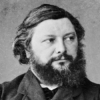Gustave Courbet

Gustave Courbet
Jean Désiré Gustave Courbetwas a French painter who led the Realist movement in 19th-century French painting. Committed to painting only what he could see, he rejected academic convention and the Romanticism of the previous generation of visual artists. His independence set an example that was important to later artists, such as the Impressionists and the Cubists. Courbet occupies an important place in 19th-century French painting as an innovator and as an artist willing to make bold social statements through his...
NationalityFrench
ProfessionPainter
Date of Birth10 June 1819
CityOrnans, France
CountryFrance